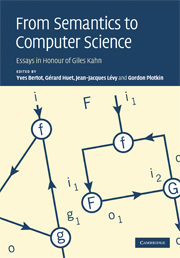Book contents
- Frontmatter
- Contents
- List of contributors
- Preface
- 1 Determinacy in a synchronous π-calculus
- 2 Classical coordination mechanisms in the chemical model
- 3 Sequential algorithms as bistable maps
- 4 The semantics of dataflow with firing
- 5 Kahn networks at the dawn of functional programming
- 6 A simple type-theoretic language: Mini-TT
- 7 Program semantics and infinite regular terms
- 8 Algorithms for equivalence and reduction to minimal form for a class of simple recursive equations
- 9 Generalized finite developments
- 10 Semantics of program representation graphs
- 11 From Centaur to the Meta-Environment: a tribute to a great meta-technologist
- 12 Towards a theory of document structure
- 13 Grammars as software libraries
- 14 The Leordo computation system
- 15 Theorem-proving support in programming language semantics
- 16 Nominal verification of algorithm W
- 17 A constructive denotational semantics for Kahn networks in Coq
- 18 Asclepios: a research project team at INRIA for the analysis and simulation of biomedical images
- 19 Proxy caching in split TCP: dynamics, stability and tail asymptotics
- 20 Two-by-two static, evolutionary, and dynamic games
- 21 Reversal strategies for adjoint algorithms
- 22 Reflections on INRIA and the role of Gilles Kahn
- 23 Can a systems biologist fix a Tamagotchi?
- 24 Computational science: a new frontier for computing
- 25 The descendants of Centaur: a personal view on Gilles Kahn's work
- 26 The tower of informatic models
- References
24 - Computational science: a new frontier for computing
Published online by Cambridge University Press: 06 August 2010
- Frontmatter
- Contents
- List of contributors
- Preface
- 1 Determinacy in a synchronous π-calculus
- 2 Classical coordination mechanisms in the chemical model
- 3 Sequential algorithms as bistable maps
- 4 The semantics of dataflow with firing
- 5 Kahn networks at the dawn of functional programming
- 6 A simple type-theoretic language: Mini-TT
- 7 Program semantics and infinite regular terms
- 8 Algorithms for equivalence and reduction to minimal form for a class of simple recursive equations
- 9 Generalized finite developments
- 10 Semantics of program representation graphs
- 11 From Centaur to the Meta-Environment: a tribute to a great meta-technologist
- 12 Towards a theory of document structure
- 13 Grammars as software libraries
- 14 The Leordo computation system
- 15 Theorem-proving support in programming language semantics
- 16 Nominal verification of algorithm W
- 17 A constructive denotational semantics for Kahn networks in Coq
- 18 Asclepios: a research project team at INRIA for the analysis and simulation of biomedical images
- 19 Proxy caching in split TCP: dynamics, stability and tail asymptotics
- 20 Two-by-two static, evolutionary, and dynamic games
- 21 Reversal strategies for adjoint algorithms
- 22 Reflections on INRIA and the role of Gilles Kahn
- 23 Can a systems biologist fix a Tamagotchi?
- 24 Computational science: a new frontier for computing
- 25 The descendants of Centaur: a personal view on Gilles Kahn's work
- 26 The tower of informatic models
- References
Summary
Abstract
In 2005 Gilles Kahn discussed with Rick Rashid, Stephen Emmott and myself a proposal for Microsoft Research, Cambridge and INRIA to establish a joint research laboratory in France, building on the long-term informal collaboration between the two institutions. The research focus of the joint laboratory was an important point of discussion. In addition to building on our mutual strengths in areas such as software specification an important topic was a shared desire to create a programme of researching the area of computational science – using the concepts and methods of computer science to accelerate the pace of scientific development and explore the potential for new approaches to science exploiting computer science concepts and methods. This paper explores what computational science is and the contribution it can make to scientific progress. It is in large part abridged from a report “Towards 2020 Science” published by a group of experts assembled by Microsoft Research who met over three intense days to debate and consider the role and future of science, looking towards 2020 and, in particular, the importance and impact of computing and computer science in that vision.
Introduction
Computers have played an increasingly important role in science for 50 years. At the end of the twentieth century there was a transition from computers supporting scientists to do conventional science to computer science itself becoming part of the fabric of science and how science is done.
- Type
- Chapter
- Information
- From Semantics to Computer ScienceEssays in Honour of Gilles Kahn, pp. 529 - 546Publisher: Cambridge University PressPrint publication year: 2009

